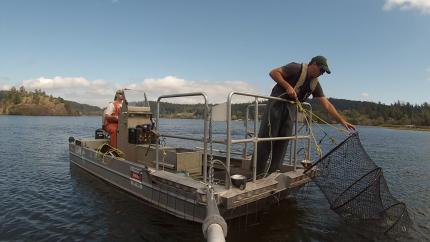
The current WDFW Warmwater Fish Program began in 1997, due in part to requests from various fishing organizations who were interested in promoting bass, walleye, and other warmwater fish species found in Washington. Legislation was passed in 1996, which created the “Warm Water Game Fish Enhancement Program” and funding for it. The program is paid for in full by “dedicated” funds, which come from a portion of each freshwater and combination fishing license sale.
The primary goal of the WDFW Warmwater Fish Program is to enhance and increase fishing opportunities for warmwater game fish in Washington where it is appropriate to do so, while at the same time contributing to the protection of native species in areas where negative interactions could occur. Warmwater Fish Program management goals and typical work include, but are not limited to:
- Management of over a dozen species of game fish species (see Fish Identification on the landing page) by setting appropriate regulations, along with periodic artificial supplementation.
- Public outreach and promotion of warmwater fishing opportunities statewide to encourage increased participation of this very popular sport (e.g. contact with fishing clubs, sports shows, public schools, colleges, military installations, radio spots, special events, along with reports, informational videos, brochures, etc.).
- Continually updating data and knowledge of Washington’s warmwater fish resources.
- Identifying under-utilized warmwater resources statewide, such as Smallmouth Bass and panfish (e.g. Bluegill and Yellow Perch), and the promotion of these fishing opportunities to the public.
- Fall Walleye Index Netting (“FWIN”) surveys, which analyze key Walleye populations.
- Acquisition of grants for the purchase, development and improvement of WDFW water access sites, which provide access for both shore and boat anglers.
- Purchasing or hatchery-rearing of warmwater fish for stocking.
- Developing and maintaining warmwater fishing opportunities in urban settings.
- Conducting standardized fish community surveys to collect data for use in management recommendations on specific waters (see Warmwater Fish Surveys).
- Publication of technical and fishing reports generated from data collected in the field (see Publications).
- Administration of the fishing contests (tournament) program.